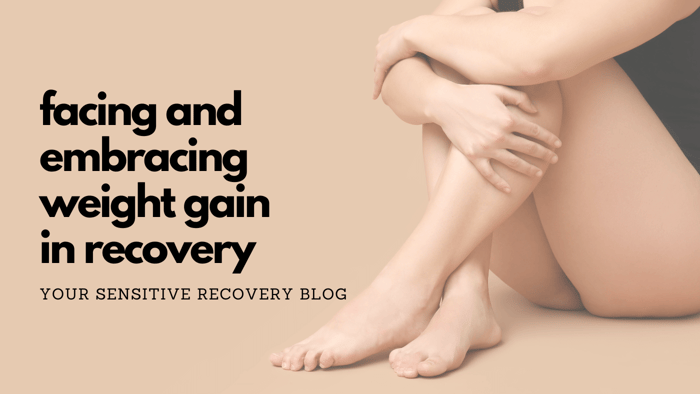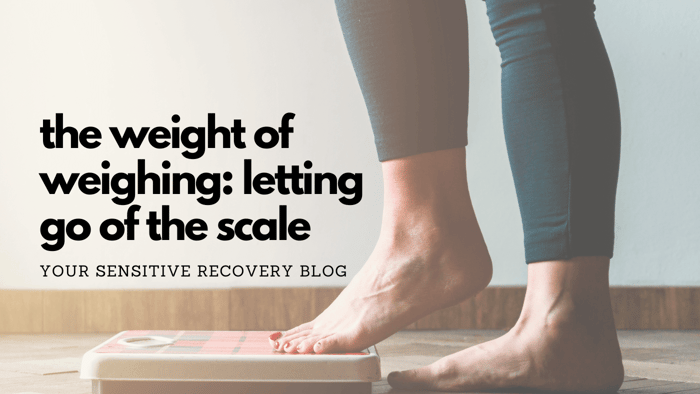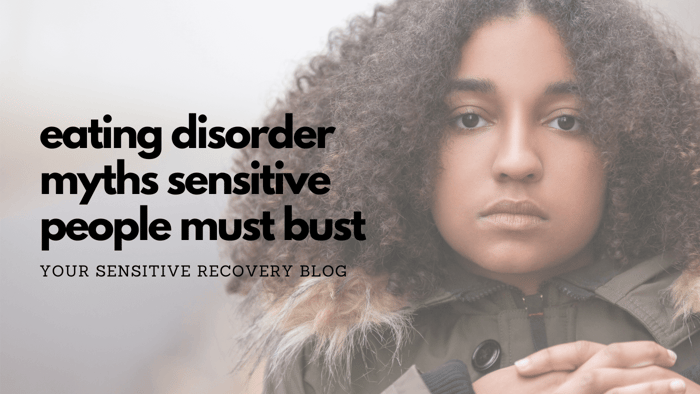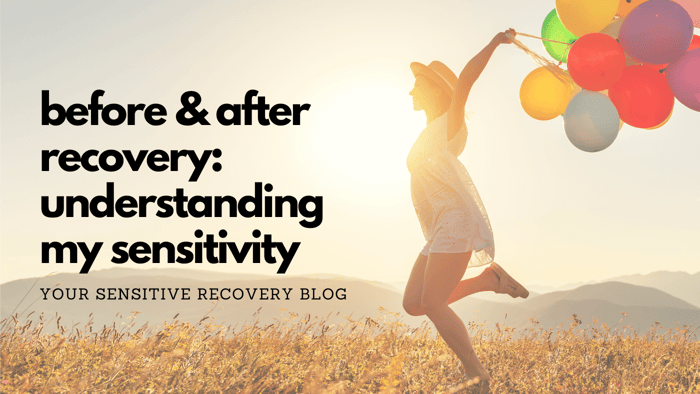Individuals with eating disorders face many intense emotional and psychological challenges every day during recovery. One of the most difficult aspects of this process for many is coping with weight gain.
Allowing the body its due sovereignty to reach and maintain its "happy weight" is a necessary and vital part of healing, but it can, of course, trigger a whirlwind of emotions and self-doubt.
This post explores insights and strategies that can support you as you navigate a changing body during recovery in a fatphobic society. I hope to provide compassionate guidance to help you foster a more resilient and embracing mindset for your healing journey.
There is No Avoiding This
While fewer than 6% of people diagnosed with an eating disorder are classified as "underweight," all individuals will experience some degree of bodily change through the process of recovery.
I understand that the above sentence may be incredibly frightening. But please keep reading.
It's important to remember that your body may be quite compromised at any size, including times when you feel "fine." Even if you're physically stable, having an eating disorder means your body is experiencing a great deal of stress and trauma. Its needs, its trust, and its sense of safety have been altered. Sometimes drastically.
The recovery process will mean many things for you. Your body will change. But truthfully, it would have changed anyway, even if you never developed an eating disorder. Because that's what bodies do.
We celebrate this SO much in children. We document it in photos, in journals, and in diaries. And over time, we swallow the lie that this is supposed to cease entirely in adulthood, and if we don't stay the same size from college to our 30s, 40s, and beyond, it somehow means we failed.
Well, someone certainly profits from this belief system - and it's not us.
The Hard Truths
Another lie we swallow when we live with an eating disorder is that we can control or dictate our body's size ad infinitum. That's just not the case. Our bodies are extremely intelligent and adaptable and will fight to maintain the weight at which all systems are optimally functioning AND the body feels safest in regards to the availability and consistency of nourishment and care.
This is different for every single body.
Nobody knows where your body will settle post-eating disorder. Professionals can make educated guesses regarding the likely range of this weight for your body, based on your history, your family history, and more. But nobody knows for sure. This is a seemingly terrible truth that recovering individuals (who so often try to base their lives on black-and-white facts) must accept:
Here are some other important truths I have learned through my own experience and my work with others:
- Recovering into any size body is very hard
- Recovering into a larger body has additional challenges due to weight stigma and barriers.
- Recovering into a larger body does not mean you did recovery wrong.
- Even if your body settles at its "happy weight", it will not be there forever. Bodies are meant to change.
- How you feel about your body IN recovery is not the same as how you will feel when you're RECOVERED.
Let me add that not everybody jives with the idea of being recovered. I use this language because it is true for me. Some folks use the language of recovering, indefinitely, and that works for them. To each, their own! The sentiment remains - then is not now, and now is not later. The only thing constant is change.
Making Space For Grief
All change is associated with some form of loss. Whether you are recovering into a body similar in size and shape to that of your pre-eating disorder body, or into a very different one, we must make and hold space for grief.
Grief for prior versions of your body.
Grief for lost privilege or a lost perception of safety.
Grief for letting go of what may have been a lifelong pursuit.
Grief for the pain and torment your body endured for the sake of that pursuit.
Grief for the unfathomable injustices that exist in our fatphobic society.
It is important to feel and honor all of this and to let it move through you. Some ways to do this include:
- processing with a trusted, affirming therapist, support group, friend, or family member
- crying, shaking, trembling, and screaming
- writing and visual and performance art
Coping Through The Process
There are several ways to support yourself during this phase of your recovery (and whenever you experience distress related to your body's shape or size.
Prioritize Comfort
Choose clothing that feels good. When shopping for new clothing, avoid shopping by numerical size as much as possible and instead take several choices into a dressing room to assess by fit only. Donate clothing that is too small, tight, or simply uncomfortable. Dress in light layers so you can quickly adjust to temperature changes as needed.
Ditch the Scale
I knowwwww. This is really hard and really scary. But having a scale around will almost always sabotage your progress. Why? Because you're used to this number, this little appliance dictating not only how you think you should behave, but also how you feel. Would you take advice from another appliance? Say...your toaster? Look, this step was a process for me. I ditched and then re-purchased (in moments of panic) 3 or 4 scales before I kicked the habit for good. I know that you could always buy another, but not having one in your home increases the precious, essential time between urge and action. If you need consistent monitoring at this stage (either for accountability or your own peace of mind), check out some of the numberless scales that are available now that you could possibly use with your treatment team.
Set Supportive Boundaries
Here are a few ideas: Ask your loved ones to not make any comments about your weight, even ones they think are compliments. If a provider is monitoring your weight, collaborate about if and how you will be informed of any changes. When at medical appointments, especially when unrelated to your eating disorder, you have the right to opt out of being weighed (in almost all cases) and you can ask that no weight (not even estimations) be added to your paperwork since most patients have access to their digital charts.
Adjust Your Language
Words matter. You may find it helpful to refer to this process for now as weight restoration or stabilization instead of gain. If you notice a lot of negative assumptions about the process (e.g. "This is going to be intolerable" or "I'm so scared of weight gain", practice small shifts that leave room for the process to be better than expected. Try, "I used to try and make my body smaller to please others", or "Up until now I couldn't imagine being at a higher weight." Some folks find that using pronouns when speaking about their body automatically increases the level of compassion and care. For example, "She [my body] feels fatigued and stiff today."
Journal
Perhaps write about what you are gaining besides weight, or write an apology letter to your body, allowing it to then write back to you. You could explore the qualities you care about in your loved ones that have nothing to do with their body size. Or, you can simply use your journal as a space to empty your mind of its fear and anxieties related to this process, and document small wins and successes.
You Can Do This
Recovery is challenging. Continuing to live with an eating disorder is a different kind of challenge. You may be tempted to give up too soon, deciding that it's just too intolerable to experience a changing body. You are not alone. Remember, how you feel now will 100% change.
It is possible to make peace with your soul's home. One bite at a time, you can do this.
✨ Josie Munroe, LMFT is a licensed therapist and owner of JosieMunroe.com and Your Sensitive Recovery As a recovered clinician and Highly Sensitive Person, she loves supporting others on their journeys to form new, empowered relationships with food, their bodies, and their sensitivity. Join the newsletter for a weekly boost of hope and inspiration. You deserve a recovery that works for you! ✨





